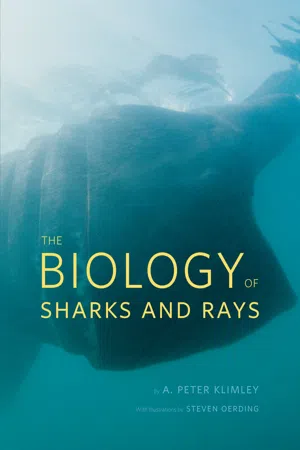
- English
- PDF
- Available on iOS & Android
eBook - PDF
The Biology of Sharks and Rays
About this book
The Biology of Sharks and Rays is a comprehensive resource on the biological and physiological characteristics of the cartilaginous fishes: sharks, rays, and chimaeras. In sixteen chapters, organized by theme, A. Peter Klimley covers a broad spectrum of topics, including taxonomy, morphology, ecology, and physiology. For example, he explains the body design of sharks and why the ridged, toothlike denticles that cover their entire bodies are present on only part of the rays' bodies and are absent from those of chimaeras. Another chapter explores the anatomy of the jaws and the role of the muscles and teeth in jaw extension, seizure, and handling of prey. The chapters are richly illustrated with pictures of sharks, diagrams of sensory organs, drawings of the body postures of sharks during threat and reproductive displays, and maps showing the extent of the species' foraging range and long-distance migrations. Each chapter commences with an anecdote from the author about his own personal experience with the topic, followed by thought-provoking questions and a list of recommended readings in the scientific literature.
The book will be a useful textbook for advanced ichthyology students as well as an encyclopedic source for those seeking a greater understanding of these fascinating creatures.
The book will be a useful textbook for advanced ichthyology students as well as an encyclopedic source for those seeking a greater understanding of these fascinating creatures.
Frequently asked questions
Yes, you can cancel anytime from the Subscription tab in your account settings on the Perlego website. Your subscription will stay active until the end of your current billing period. Learn how to cancel your subscription.
No, books cannot be downloaded as external files, such as PDFs, for use outside of Perlego. However, you can download books within the Perlego app for offline reading on mobile or tablet. Learn more here.
Perlego offers two plans: Essential and Complete
- Essential is ideal for learners and professionals who enjoy exploring a wide range of subjects. Access the Essential Library with 800,000+ trusted titles and best-sellers across business, personal growth, and the humanities. Includes unlimited reading time and Standard Read Aloud voice.
- Complete: Perfect for advanced learners and researchers needing full, unrestricted access. Unlock 1.4M+ books across hundreds of subjects, including academic and specialized titles. The Complete Plan also includes advanced features like Premium Read Aloud and Research Assistant.
We are an online textbook subscription service, where you can get access to an entire online library for less than the price of a single book per month. With over 1 million books across 1000+ topics, we’ve got you covered! Learn more here.
Look out for the read-aloud symbol on your next book to see if you can listen to it. The read-aloud tool reads text aloud for you, highlighting the text as it is being read. You can pause it, speed it up and slow it down. Learn more here.
Yes! You can use the Perlego app on both iOS or Android devices to read anytime, anywhere — even offline. Perfect for commutes or when you’re on the go.
Please note we cannot support devices running on iOS 13 and Android 7 or earlier. Learn more about using the app.
Please note we cannot support devices running on iOS 13 and Android 7 or earlier. Learn more about using the app.
Yes, you can access The Biology of Sharks and Rays by A. Peter Klimley,Steven Oerding in PDF and/or ePUB format, as well as other popular books in Biological Sciences & Evolution. We have over one million books available in our catalogue for you to explore.
Information
Table of contents
- Contents
- Chapter 1. An Introduction to the Cartilaginous Fishes
- Chapter 2. Evolutionary History
- Chapter 3. Body Design and Swimming Modes
- Chapter 4. Water and Ionic Regulation
- Chapter 5. Warming of the Body
- Chapter 6. Sense of Smell: Chemoreception
- Chapter 7. Sense of Hearing: Mechanoreception
- Chapter 8. Sense of Sight: Photoreception
- Chapter 9. Sense of Electromagnetic Fields: Electroreception/Magnetoreception
- Chapter 10. Brain Organization and Intelligence
- Chapter 11. Courtship and Reproduction
- Chapter 12. Feeding Behavior and Biomechanics
- Chapter 13. Diet and Growth
- Chapter 14. Daily Movements, Home Range, and Migration
- Chapter 15. Cartilaginous Fishes and Humans
- Chapter 16. Fisheries and Conservation
- References
- Illustration Credits
- Index